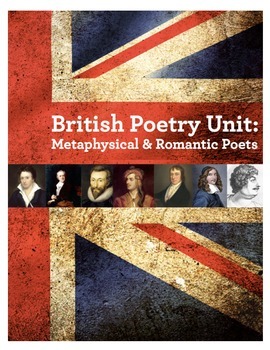British Poetry Unit: Metaphysical and Romantic Poets
Open Classroom
1k Followers
Grade Levels
10th - 12th, Homeschool
Subjects
Resource Type
Standards
CCSSRL.11-12.1
CCSSRL.11-12.4
CCSSW.11-12.1
CCSSW.11-12.2a
CCSSW.11-12.2b
Formats Included
- PDF
Pages
33 pages
Open Classroom
1k Followers
Description
This British poetry unit covers the best metaphysical and Romantic poets including Marvell, Herrick, Donne, Shelley, Byron, Keats, Wordsworth and Browning while addressing all strands of the Common Core State Standards. As a group, students conduct research, analyze poetry, create class handouts or PowerPoints and present their findings to their classmates. Independently, students write a poetry explication. To wrap up the unit, students review with a trivia game followed by a multiple choice and written response test. Students generally enjoy reading these sometimes bawdy poems of love, whether answered or unrequited!
This unit includes:
* British Poetry Presentation Assignment (a handout assignment or PowerPoint assignment)
* Poetry Groups Research Topics and Sign-Up Sheet
* Poetry Presentation Rubric
* Group Presentation Self-Assessment
* Poetry Packet (with 8 poems) and Teacher Notes
* Poetry Explication Handout (with questions and tips to prompt writing)
* Poetry Explication Rubric
* British Poetry Trivia Questions (total of 25 questions) for test review with Teacher Key
* British Poetry Test (multiple choice and written response) with Teacher Key
Did you know this unit is part of my British Literature Bundle? The bundle includes 7 resources for a 25% discount. **Please do not purchase this unit in addition to the Brit Lit bundle**
**The British Poetry Presentation Set is a shorter version of this unit without the explication assignment or unit test. Please do not purchase both.**
This unit would fit well in a British Literature course, an AP Literature and Composition course or a general poetry unit.
This unit includes:
* British Poetry Presentation Assignment (a handout assignment or PowerPoint assignment)
* Poetry Groups Research Topics and Sign-Up Sheet
* Poetry Presentation Rubric
* Group Presentation Self-Assessment
* Poetry Packet (with 8 poems) and Teacher Notes
* Poetry Explication Handout (with questions and tips to prompt writing)
* Poetry Explication Rubric
* British Poetry Trivia Questions (total of 25 questions) for test review with Teacher Key
* British Poetry Test (multiple choice and written response) with Teacher Key
Did you know this unit is part of my British Literature Bundle? The bundle includes 7 resources for a 25% discount. **Please do not purchase this unit in addition to the Brit Lit bundle**
**The British Poetry Presentation Set is a shorter version of this unit without the explication assignment or unit test. Please do not purchase both.**
This unit would fit well in a British Literature course, an AP Literature and Composition course or a general poetry unit.
Total Pages
33 pages
Answer Key
Included
Teaching Duration
1 Week
Last updated Mar 12th, 2013
Report this resource to TPT
Reported resources will be reviewed by our team. Report this resource to let us know if this resource violates TPT’s content guidelines.
Standards
to see state-specific standards (only available in the US).
CCSSRL.11-12.1
Cite strong and thorough textual evidence to support analysis of what the text says explicitly as well as inferences drawn from the text, including determining where the text leaves matters uncertain.
CCSSRL.11-12.4
Determine the meaning of words and phrases as they are used in the text, including figurative and connotative meanings; analyze the impact of specific word choices on meaning and tone, including words with multiple meanings or language that is particularly fresh, engaging, or beautiful.
CCSSW.11-12.1
Write arguments to support claims in an analysis of substantive topics or texts, using valid reasoning and relevant and sufficient evidence.
CCSSW.11-12.2a
Introduce a topic; organize complex ideas, concepts, and information so that each new element builds on that which precedes it to create a unified whole; include formatting (e.g., headings), graphics (e.g., figures, tables), and multimedia when useful to aiding comprehension.
CCSSW.11-12.2b
Develop the topic thoroughly by selecting the most significant and relevant facts, extended definitions, concrete details, quotations, or other information and examples appropriate to the audience’s knowledge of the topic.





